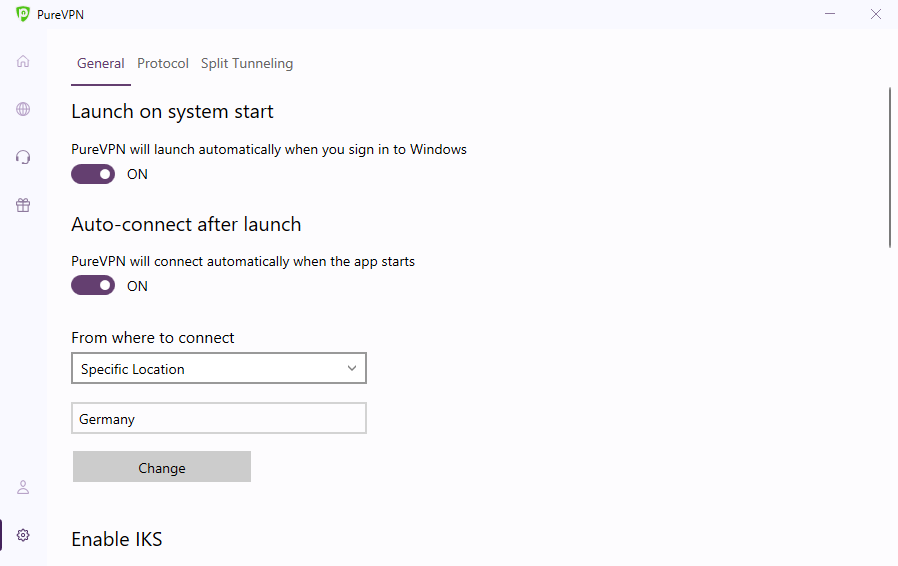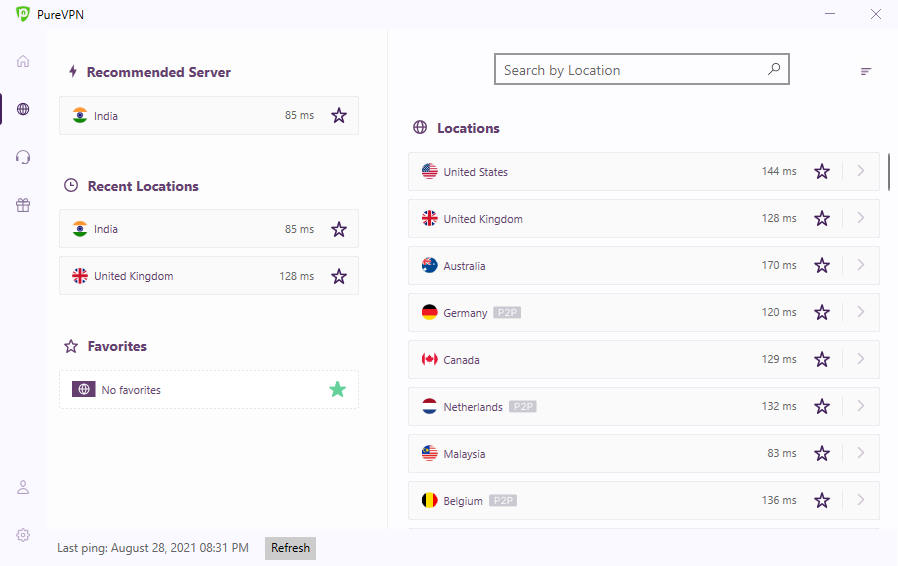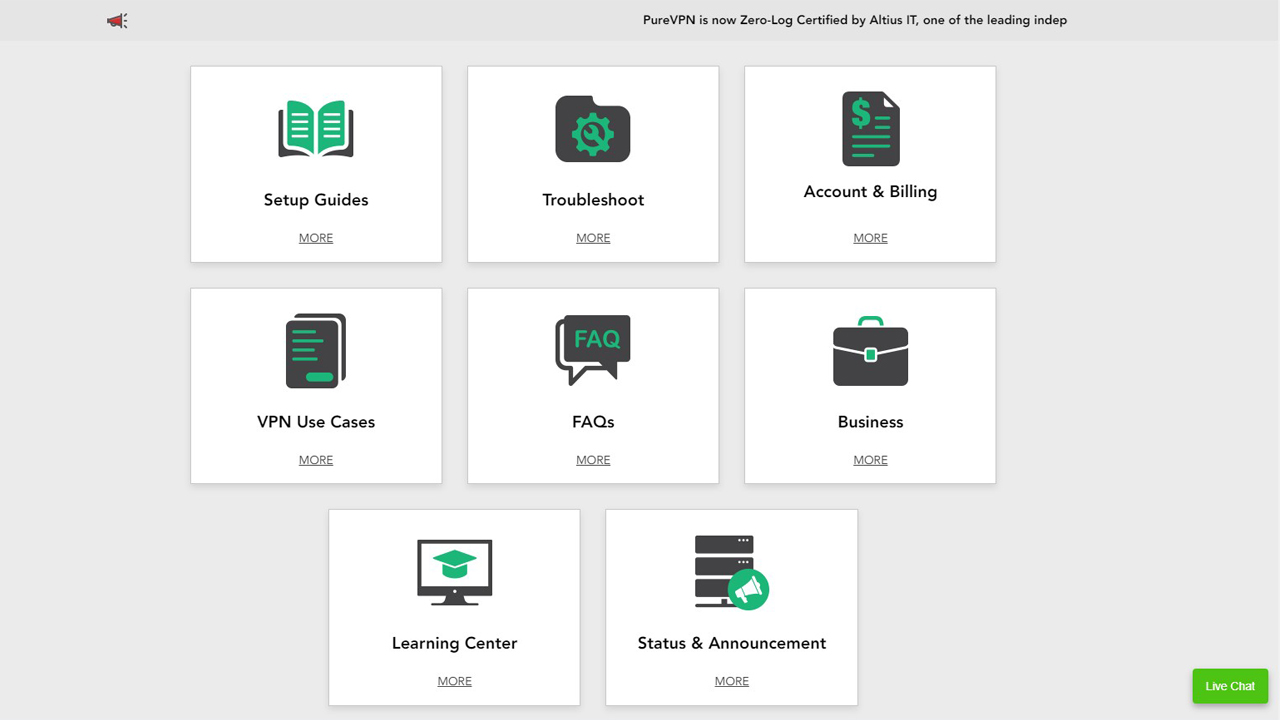How To Use Purevpn On Iphone
Our Verdict
PureVPN offers tons of servers across the globe, delivers some very useful features and is very affordable if you pick a long-term plan. However, kill switch issues, poor support, and lower connection speeds than the competition means it still can't crack the top tier of the industry.
For
- Recent zero-logging audit passed
- Plenty of simultaneous connections to share out
- Useful for Netflix, Disney+, and BBC iPlayer
- Huge range of devices supported
Against
- Both live chat and on-site support are poor
- Unable to unblock Amazon Prime Video
- Slightly buggy apps, including the kill switch
Tom's Guide Verdict
PureVPN offers tons of servers across the globe, delivers some very useful features and is very affordable if you pick a long-term plan. However, kill switch issues, poor support, and lower connection speeds than the competition means it still can't crack the top tier of the industry.
Pros
- + Recent zero-logging audit passed
- + Plenty of simultaneous connections to share out
- + Useful for Netflix, Disney+, and BBC iPlayer
- + Huge range of devices supported
Cons
- - Both live chat and on-site support are poor
- - Unable to unblock Amazon Prime Video
- - Slightly buggy apps, including the kill switch
PureVPN has been around for a long time – since 2007, to be exact – and in that time it's established its name as a feature-packed consumer VPN that offers plenty of value for money. With over 6,500 servers in 78 countries, it provides a wide range of locations to connect to, and extras like P2P support, IPv6 and DNS leak protection and more will appeal to the more knowledgeable user.
Here, we're undertaking an in-depth PureVPN review to determine if it can really compete with the best VPN providers on the market today.
If you're interested in a particular aspect of PureVPN, you can jump to a particular section by using the navigation bar at the top of the page. Otherwise, just keep scrolling for our full PureVPN review.
PureVPN 1-minute review
PureVPN's pricing is about average, but longer plans head towards the cheaper end of the scale. 1 month will set you back $10.95, 1 year will cost you $3.32 a month, and at the time of writing, 2 years is just $2.04 a month. PureVPN also offers a 31-day money-back guarantee so you can try before you commit.
At its core, PureVPN is secure and offers a good baseline of specs. You'll get access to OpenVPN and IKEv2 (with WireGuard in beta), have full torrenting support DNS and IPv6 leak protection, split tunneling, and a kill switch which should cut your connection if the VPN drops out.
You'll also get apps for a huge range of devices, including PC, Mac, Linus, iOS and Android, plus extensions for Firefox and Google Chrome. There are also plenty of walkthroughs to help you get up and running on devices that are a little more niche, like Amazon Fire Stick, android TV, Kodi, routers and more.
Last time we reviewed PureVPN we saw that it had a huge breadth of server locations at 180+ in over 140 countries, but although the server count has stayed at 6,500, that's been whittled down to 86 locations in 78 countries.
That's arguably a good thing, though, as the remover servers were reportedly poorly performing virtual servers, and 78 is still a fine selection to choose from.
PureVPN has also recently started upgrading its server infrastructure from 10Gbps to 20Gbps, which means more throughput and better performance for users. Read more on that here.
Finally, PureVPN has relocated to VPN hotspot the British Virgin Islands, moving away from Hong Kong, but the more important update is the provider's brand new zero-logging audit, which we'll expand upon below.
PureVPN on paper
Number of servers: 6,500+
Number of countries: 78
Platforms supported: Windows, Mac, Android, iPhone, iPad, Linux, Chrome, Firefox, Routers, Android TV, Amazon FireStick, Microsoft Surface, Kodi, Roku, Boxee, Now TV Box, Raspberry Pi, Chromecast, PlayStation, Xbox
Simultaneous connections: 10
Split tunneling: Yes
Kill switch: Yes
Supported protocols: OpenVPN UDP, OpenVPN TCP, IKEv2/IPSec
Country of registration: British Virgin Islands
Support: 24/7 live chat, email, knowledgebase
Latest updates
Since we undertook our comprehensive review of PureVPN, a couple of important changes have occurred.
Firstly, we've seen the number of server locations trimmed down to 78 countries from 140+. That's a good thing, though since the ones we've lost were slow virtual servers.
The biggest news, though, is the fact that PureVPN has just undertaken a successful no-logging audit. That's a big tick any privacy fan's copybook.

PureVPN price: how much is it, and is there a PureVPN free trial?
Starting out at $10.95 for a single-month plan, PureVPN is hardly a bargain – but this is what we've come to expect from most VPNs if you want the luxury of a rolling contract. To save a bit of cash, you'll want to commit for a little longer.
1 year will set you back $3.32 a month, which works out at about $40 all in, and 2 years costs just $2.04, or just under $50 all in. Be aware, though, that these are special Black Friday prices – when they change, we'll update the specifics.
PureVPN has been known to offer some very impressive deals, including a mega 5-year plan, so if you're interested it's well worth checking the site itself to see if it's running any flash deals. You can also bag a 7-day trial for just $0.99, which is great for testing out the service.
Beyond the basic pricing, you can bag a dedicated IP for $2.99/mo (cheap compared to the competition), DDoS protection for $3.99/mo, and port forwarding for $0.99/mo, but we had a few issues adding these to the cart – and when we contacted the live chat support agent, we got absolutely no help at all.
Whichever plan you choose, you'll be covered by a 31-day no-quibble money-back guarantee so that you can test it out, which is a generous 1 day more than the apparent industry standard, and payments can be made with credit card, PayPal, and now Bitcoin.
How private is PureVPN, and does it keep logs?
PureVPN doesn't have a spotless record when it comes to protecting user data. In 2017, a man was arrested for online wrongdoings, and part of the evidence used to do so were PureVPN records which included his work and home IP addresses. Ethics aside, this isn't good form for a VPN – services primarily designed and used as privacy tools.
Since then, PureVPN has taken efforts to be able to truthfully claim to be a 'zero-logging' VPN, and has undertaken audits of its security systems and privacy policies. The most recent verifies that PureVPN is now truly zero-logging, which helps put our minds at rest.
PureVPN states in its provacy policy: ' We DO NOT keep any record of your browsing activities, connection logs, records of the VPN IPs assigned to you, your original IPs, your connection time, the history of your browsing, the sites you visited, your outgoing traffic, the content or data you accessed, or the DNS queries generated by you '
However, if you look a little closer, you'll see that it does collect the day you connected to a specific location, your ISP, the connection length, how many connections you make, and your overall bandwidth usage. there's nothing in there that should be able to identify you, but we feel the opening statement of the privacy policy is a little disingenuous all the same.
In terms of apps and features, you'll get some useful extras like IPv6 and DNS leak protection, a multi-port option, port forwarding and the possibility to use a non-NAT network to use a unique IP address.

How fast is PureVPN?
Speed is an important part of any VPN, and PureVPN's performance was mixed. In our tests on a 1Gbps US connection, we saw OpenVPN speeds of 210-220Mbps, which is similar to our last tests, but lagging behind the fastest VPN providers.
In the UK, things were a little better, with OpenVPN reaching a nippy 270Mbps. While again that's not the very fastest, it's certainly up there.
IKEv2 speeds, however, were relatively slow, at just 100-110Mbps, similar to our last tests.
In reality, these speeds will be more than acceptable for most users, but as we begin to see faster and faster baseline connections, it's always advisable to futureproof your VPN choice should you have the chance to get a gigebit connection in sometime soon.
However, connection speeds can be massively variable, and although our results are aggregated from over 100 tests on a range of testing software, you might get different results – and with that 7-day trial on offer, it might be worth doing a bit of your own testing to make sure.
How good is PureVPN for streaming and torrenting?
Streaming VPN performance is important to many – and streaming is now arguably the most important factor when it comes to VPN use – so this is an essential area.
Improving on our last review, PureVPN got us access to BBC iPlayer and Disney+, two of the trickier services to crack. It also got us access to US Netflix, which, after the streaming site's renewed VPN blocking tech came into play, is quite impressive.
However, we were unable to access Amazon Prime Video, which is a shame, but even so we're glad to see PureVPN putting in the effort to up its game in the streaming sector.
If we were going to go for a dedicated streaming or Netflix VPN, we'd have to pick ExpressVPN or ProtonVPN, but PureVPN definitely didn't embarrass itself here.
In terms of torrenting VPN performance, PureVPN is fairly capable. You'll get split tunneling, NAT firewall protection, and decent download speeds as mentioned above. However, many of the most popular server locations – including the UK, US, Canada and Australia – block P2P sharing. While there's nothing stopping you from selecting a different server, providers like ExpressVPN or NordVPN either allow torrenting on every server, or will automatically reroute your connection to one that does.

How good are PureVPN's desktop apps?
On first open, PureVPN's apps are plain and white, which is no bad thing. We like keeping it simple. All you'll see is the on/off switch, but a single click will bring up the location list, and further icons down the side of the app will display further features.
Picking locations is intuitive, with Recents, Favorites, a useful search bar, and ping times for each server that can help you pick the fastest.
Selecting a server that's suitable for P2P, however, is rather tricky on desktop. The FAQ on-site says to look for the 'P2P icon', but in our experience that's only visible on the mobile apps. Mac and Windows users are left out in the cold.
Connection times were average to good, ranging from 3-5 seconds depending on protocol. That's perfectly acceptable.
The app offers a few extra settings – split tunneling, a kill switch, a few different protocols and the option to auto-launch when you start your PC. However, the IPv6 leak protection and multi-port options we had last time are gone.
If you get into a sticky situation, you can click the Help button, but the FAQ section this brings up is thin, and sometimes you can't even scroll all the way to the bottom of an answer. You're better off heading to the website.
However, submitting a ticket in-app is a nice addition, but it does take you to a third-party page. It's probably perfectly fine, but a little bit of PureVPN branding would go a long way here.
The biggest issue we found was the kill switch. When testing different ways of closing the connection while checking our IP address, we fairly often saw our regular IP sneak through. That means the kill switch didn't work, and the app allowed unprotected traffic through it unprotected. It's unlikely to happen in regular use, but it's not exactly perfect.
How good are PureVPN's mobile apps?
On Android, things are fairly similar, but it's pleasing to see that the apps carry over a fair amount of functionality, including an effective split tunneling feature. However, not everything claimed was present in our testing.
PureVPN says that its Android VPN has a kill switch, but in our testing there was no sign of the thing. There are also no autoconnect features either, which are fairly common on mobile clients.
iOS is a little different in layout, but overall it's much the same product and fits nicely in with the rest of the PureVPN app family. There are a few differences in functionality, though.
The iPhone VPN allows you to autoconnect when you visit specific websites – not specific networks, though – and will reconnect itself should the connection drop out. However, you won't be getting split tunneling on iOS.

What customer support does PureVPN offer?
Since our last review, PureVPN's support site has been improved, and essential guides have been updated to provide fairly comprehensive instructions to remedy most common issues users may have. In fact, there's a huge range of articles for just about every operating system, plus a plethora of suggestions for accessing Netflix.
However, some of the content is very poor, and downright misleading, like the OpenVPN manual setup guide, that sends you on a wild goose chase that end up demonstrating how to set up PPTP, an ancient protocol that PureVPN doesn't even support any more.
You can also raise a support ticket from within the app, but our experience with this wasn't stellar. Our initial query was answered in around 30 minutes – not terrible – but we only received fairly rudimentary advice, and our follow-up questions were left unanswered.
If the guides can't help you, your best bet is to use the live chat function. However, while response times were good, the actual assistance we received was less than stellar, and although it'll probably sort you out in most situations, it's nothing on the class leaders' chat services.
PureVPN: Final verdict
PureVPN's appeal lies in its wide device support, large server network, excellent value ultra-long-term plans, and – when they work correctly – the fact the apps on most operating systems deliver a decent amount of functionality. We also appreciate the commitment to user privacy, and welcome the introduction of the 'always on' audit with KPMG.
However, what's not quite so impressive are the kill switch issues and weak performance figures, which are quite feasibly problems that might affect the average user – and that's why it can't truly compete with leading providers such as ExpressVPN.
Mo is eCommerce Editor at Tom's Guide. Day-to-day he oversees privacy and security content, and his product guides help his readers find the best software and products for their needs. When he's not testing VPNs, you'll find him working on his classic car or plugged into a guitar amp.
How To Use Purevpn On Iphone
Source: https://www.tomsguide.com/reviews/purevpn-review
Posted by: maguirepeetruse.blogspot.com

0 Response to "How To Use Purevpn On Iphone"
Post a Comment